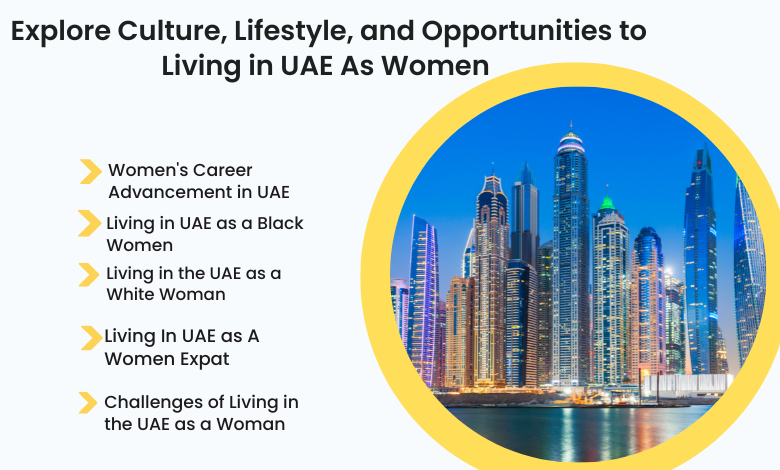Explore Culture, Lifestyle, and Opportunities to Living in the UAE As a Woman

Living in the UAE As a Woman can be both exciting and challenging. While the UAE is a cosmopolitan country that offers women many opportunities, cultural and societal norms can sometimes pose difficulties. In this article, we will explore what it is like to live in the UAE as a woman, including the benefits and challenges, as well as answer some frequently asked questions.
Benefits of Living in the UAE as a Woman One of the biggest benefits of living in the UAE. As a woman is the safety and security that the country offers. The UAE is known for having one of the lowest crime rates in the world, and women can feel safe walking around the streets at any time of day or night. Additionally, the UAE is a very clean and well-maintained country, making it a comfortable place to live.
Living in the UAE as a woman is access to world-class healthcare facilities. The UAE has many top-notch hospitals and clinics, and the government is committed to providing affordable healthcare to all residents. This means that women can access quality medical care without having to worry about the high costs associated with private healthcare in other countries.
Women’s Career Advancement in UAE
The country is home to many multinational corporations and offers a competitive job market. Women in the UAE have access to a wide range of job opportunities, from finance and marketing to healthcare and education. The UAE also has a thriving entrepreneurship scene, which means that women who want to start their businesses can do so with ease.

Living in UAE as a Black Women
Living in the UAE as a black woman can be a unique experience that comes with its challenges and rewards. The UAE is a diverse country with a multicultural society, and as such, black women can expect to encounter people from all walks of life. While the UAE is generally a welcoming and tolerant country, some black women may experience instances of discrimination or prejudice. Either intentionally or unintentionally.
However, the UAE’s government has implemented strict anti-discrimination laws, and incidents of discrimination are not common. Black women living in the UAE can enjoy a rich cultural experience and access to world-class amenities and services. With a thriving economy and a safe environment, the UAE provides ample opportunities for personal and professional growth for black women.
Living in the UAE as a White Woman
While the UAE is a Muslim country, it is relatively liberal, and women have many opportunities for education and career advancement. As a white woman, you may stand out from the majority of the local population, but you will likely receive a warm welcome and be treated with respect.
It is important to dress modestly and follow local customs, such as avoiding public displays of affection, but otherwise, you are free to explore the country and all it has to offer. Whether you are interested in shopping in world-class malls, enjoying the beautiful beaches, or learning about the rich history and culture of the UAE, you will find plenty to keep you busy and engaged.
Living In UAE as A Women Expat
Living in the United Arab Emirates as a woman expat can be a unique and fulfilling experience. While the UAE is a conservative country, it is also very modern and open to women working and living independently. Women have access to excellent healthcare, education, and job opportunities in various fields. Additionally, the UAE is home to many expats from different parts of the world, making it a diverse and welcoming community.
However, it is important to note that there are certain cultural norms and expectations that women should be aware of. And respectful towards others, such as dressing modestly and avoiding public displays of affection. Overall, with the right preparation and understanding of the culture, living in the UAE as a woman expat can be a rewarding experience.
Challenges of Living in the UAE As a Woman
While the UAE offers many benefits to women, there are also some challenges that women may face. One of the biggest challenges is the conservative societal and cultural norms that exist in the country. For example, women are expected to dress modestly in public, and this can be a difficult adjustment for women coming from more liberal countries. Additionally, women may face discrimination in the workplace, and it can be challenging to navigate the male-dominated business culture in the country.
Women may face in the UAE a lack of legal protections. While the UAE has made progress in recent years in terms of women’s rights, there are still areas where women are not afforded the same legal protections as men. For example, women who are victims of domestic violence may have difficulty seeking legal recourse, as the laws in the country can be complex and difficult to navigate.
FAQs about living in the UAE As a Woman
Frequently asked questions related to “Living in the UAE As a Woman” are as follows…
Q: Is it safe for women to travel alone in the UAE?
A: Yes, it is generally safe for women to travel alone in the UAE. The country has low crime rates, and the government places a high priority on ensuring the safety and security of both residents and visitors. However, women should still exercise caution and be aware of cultural norms and local customs.
Q: Do women have to wear hijab in UAE?
A: Women who are visiting Dubai as tourists are not compelled to wear the burqa, the hijab, or any other local dress. In Dubai, what can ladies wear out in public? As long as it covers their shoulders and knees, Dubaian women visitors are free to dress however they like.
Q: Is it difficult for women to find work in the UAE?
A: While the job market in the UAE is competitive, women have access to a wide range of job opportunities. However, women may face discrimination in the workplace and may need to navigate a male-dominated business culture.
Q: What are the rules for women living in Dubai?
Dress code
When in public spaces like malls, women should dress modestly. Underwear should not be exposed, and the tops of the arms and legs should be covered by clothing. Only at swimming pools or on beaches should you wear swimming clothes. Cross-dressing is not permitted.
Q: What is the healthcare system like for women in the UAE?
A: The UAE has a world-class healthcare system, and women have access to quality medical care. The government is committed to providing affordable healthcare to all residents, which means that women can continue from previous access. Medical treatment without having to worry about high costs.
Q: Are women allowed to participate in sports in the UAE?
A: Yes, women are allowed to participate in sports in the UAE. In recent years, the country has made strides in promoting women’s sports, and there are many opportunities for women to get involved in various sports activities.
Q: What is the social life like for women in the UAE?
A: The social life in the UAE is diverse, and there are many opportunities for women to get involved in social activities. However, women should be aware of cultural norms and be respectful of local customs when participating in social events.
Q: What is the dating scene like for women in the UAE?
A: The dating scene in the UAE can be challenging for women, as there are strict social and cultural norms around relationships. Additionally, it can be difficult for women to meet potential partners outside of their social circle.
Q: Are women allowed to travel alone in the UAE?
A: Yes, women are allowed to travel alone in the UAE. However, they should exercise caution and be aware of local customs and laws when traveling.
Q: What is the education system like for women in the UAE?
A: The education system in the UAE is of a high standard, and women have access to quality education. The government is committed to promoting education for all residents, which means that women have many opportunities to further their education and advance their careers.
Conclusion Living in the UAE As a Woman
Living in the UAE as a woman can be both rewarding and challenging. While the country offers many benefits including safety and security access to quality healthcare and job opportunities. Women may also face challenges related to conservative societal norms and a lack of legal protections.




